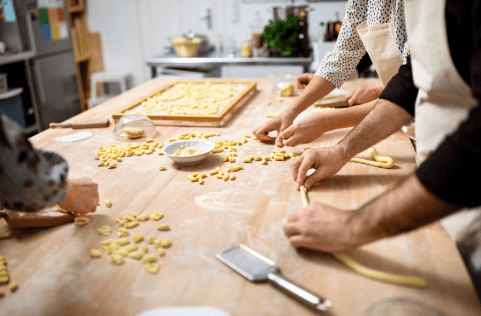As humans, eating is an essential part of our experience. It keeps us alive and provides nourishment for the things that mean the most to us.
As non-diet Registered Dietitians we have clients come to us all the time looking for the answers to simply being able to “eat when I’m hungry and stop when I’m full”. They feel an intense gravitational pull towards food that they wish was no longer there.
And, while being able to decentralize food from your life and have a more neutral relationship is so integral in the work that we do (mostly by ensuring you are meeting your needs and working to challenge diet culture), we also don’t want to make food *just* food. Because it is also so much more than that.
Food is: emotional, social, cultural, nostalgic, pleasurable - the list goes on!
And, if you ask us, wanting to solely eat when you’re hungry and being able to stop when you are the “perfect” amount of fullness could be a (potentially unconscious) way of controlling your intake. And, we know that the more we try to control food, the more out of control we feel around it.
Below, we’re walking through some additional reasons you may choose to eat throughout the day. Hopefully, this will help broaden your overall perspective of the meaning and purpose of food. And, maybe, help you take a step towards feeling a bit more free with your food choices. Let’s dive in!

reasons we eat
emotional
Yes - you heard us right! Food can be emotional. And that’s ok!
Feeling excited after a baseball win - let’s celebrate with ice cream! Feeling upset after a break up - ice cream helps with that as well!
Our culture nowadays demonizes the idea of emotional eating and, while we have some thoughts (linked here), we mostly think that demonizing this behavior is not an effective way to change the behavior. Moreover, if we give ourselves permission to mindfully have food when we are feeling a wide range of emotions, it can help reduce the shame around the experience. And, with a reduction of shame, it can allow us to approach a situation with a sense of neutrality and presence to be able to determine if this is a helpful or unhelpful behavior.
As always, ensuring that you have a wide variety of coping skills in the toolbox is beneficial to provide options when dealing with emotions. Again, more on that here.
social
I don’t know about you, but some of my favorite days and nights have been spending time with people I love around a table of sorts!
Socially eating is a way of connecting with others and can positively impact our mental health in many ways. If you’re noticing yourself withdrawing from social situations due to anxiety around the food being present, give us a call. This may be a sign to check in on your current relationship with food and ensure that your health promoting practices are not heading towards unhealthy territory.
nostalgia
If I close my eyes now I can almost smell grandma’s homemade pasta and meatballs on Sundays. Anytime I make that meal now I think of the family time spent together and all of the love that was in that kitchen.
When you think about your relationship with food, having positive food memories is important. It helps to signal the ways that connections with food brought about deeper, meaningful connections with others or with yourself.

planning
Have you ever sat down for your day and realized you are fully booked solid in meetings from 11 AM until 2 PM? I’m already feeling tired just thinking about it! You ate breakfast not too long ago and aren’t exactly *starving* but know that if you don’t have something before that 11 AM meeting starts, you are going to be ravenous by 2 PM. So you enjoy a bite to eat and get ready to feel energized for your long working stretch!
The above scenario is a perfect example of eating in the absence of physical hunger due to a scheduling need. If you had tried to muscle through your 11 AM-2 PM stretch you may have not felt that hungry going into your first meeting, but as that 2 PM time came around you would most likely be ravenous coming off your call. Maybe this sets the stage for a binge or out of control eating experience.
Sometimes, as humans, we have to be more mechanical in our eating habits to prepare and care for our future selves!
Are you feeling like this is something you may need support with? Click the link to see how a non-diet dietitian could support you.
cultural
Every corner of the world has such a wide range of food offerings specific for their region. And every culture views food differently. Being able to celebrate a piece of yourself through your cultural food is a beautiful thing. Let’s stop demonizing cultural foods and start recognizing the benefit of connecting to your heritage as a health promoting practice. And understanding that the Westernized view of wellness is not the only way to live a healthful lifestyle!
pleasure
This one is short and sweet. You are allowed to enjoy foods simply because they taste good. Food is allowed to be pleasurable. In fact, we think that foods *should* be pleasurable.
Will every meal meet all of our satisfaction needs? Probably not. But, the more you understand the types of flavors, textures, cuisines that you enjoy, the closer we can get to enhanced eating experiences. More on ways to reconnect with satisfaction here.
biological hunger
Our final reason to eat is biological hunger. Hunger may (or may not) be connected to any and all of the above reasons. But, you may be shocked by how many clients come into our office and feel *totally* disconnected from their hunger. Years of dieting, disordered eating and other factors have left them feeling a bit stuck when it comes to the question - “how does hunger feel for you?”
Working on improving your connection to your body cues by understanding your hunger signals (because they are different for everyone) can be an important step to healing your relationship with food. More on that here!

how nourishrx can support you
In summary, food is fuel AND so much more. In your journey towards food freedom and improving your health, let’s not only connect you to your hunger and fullness cues but also help neutralize the many different reasons you may choose to eat in a given moment.
Enjoying food is not shameful and we are so sorry if you were ever made to feel that way. We recognize that the road towards a more neutral or positive relationship with food can feel daunting - you’re doing great! Our team is here to support you through 1:1 nutrition counseling and action-oriented coaching.
Contact our office or schedule yourself online NOW to learn more.
Let’s take a step towards food freedom together.
Comments Off on Exploring the Reasons Why We Eat: It’s More Than Just Hunger